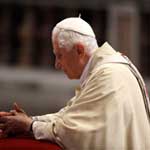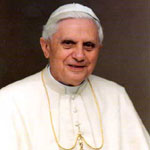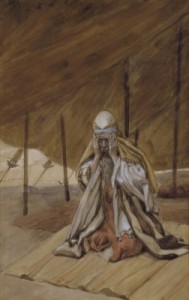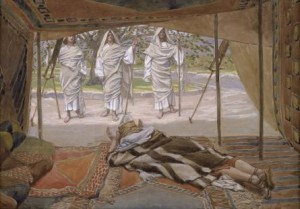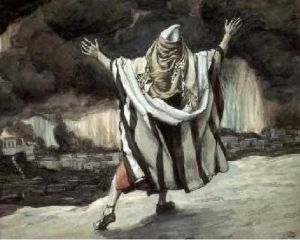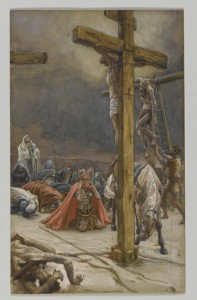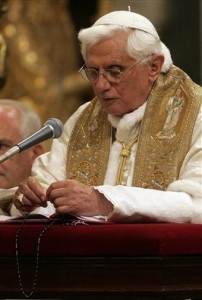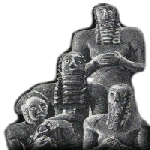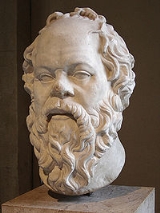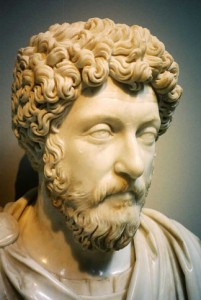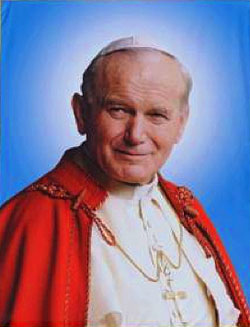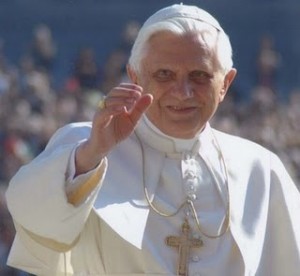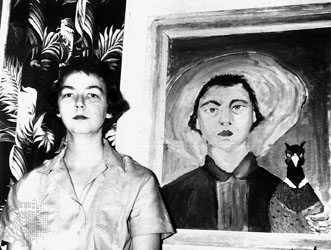For Complete Updated Text in English click here
VATICAN CITY, 25 MAY 2011 (VIS) – Continuing with his catecheses on prayer, Benedict XVI spoke in today’s general audience about the Patriarch Jacob and his fight with the unknown man at the ford of the Jabbok. The audience was held in St. Peter’s Square with 15,000 people in attendance.
The Bible, explained the Pope, describes Jacob as an astute man who obtains things through deception. At a certain point, he sets out to return to his homeland and face his brother, whose firstborn birthrights he had taken. Jacob waits overnight in order to cross the ford safely but something unforeseen occurs: he is suddenly attacked by an unknown man with whom he struggles the entire night. The story details their struggle, which has no clear winner, leaving the rival a mystery. “Only at the end, when the struggle is finished and that ‘someone’ has disappeared, only then will Jacob name him and be able to say that he had struggled with God”.
Once the fight is over Jacob says to his opponent that he will only let him go if he blesses him. Jacob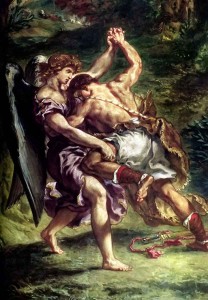 “who had defrauded his brother out of the first-born’s blessing through deceit, now demands [a blessing] from the unknown man, in whom he perhaps begins to see divine traits, but still without being able to truly recognize him. His rival, who seems restrained and therefore defeated by Jacob, instead of bowing to the Patriarch’s request, asks his name. … In the Biblical mentality, knowing someone’s name entails a type of power because it contains the person’s deepest reality, revealing their secret and their destiny. … This is why, when Jacob reveals his name, he is putting himself in his opponent’s hands. It is a form of surrender, a complete giving over of himself to the other”.
“who had defrauded his brother out of the first-born’s blessing through deceit, now demands [a blessing] from the unknown man, in whom he perhaps begins to see divine traits, but still without being able to truly recognize him. His rival, who seems restrained and therefore defeated by Jacob, instead of bowing to the Patriarch’s request, asks his name. … In the Biblical mentality, knowing someone’s name entails a type of power because it contains the person’s deepest reality, revealing their secret and their destiny. … This is why, when Jacob reveals his name, he is putting himself in his opponent’s hands. It is a form of surrender, a complete giving over of himself to the other”.
Paradoxically, however, “in this gesture of surrender, Jacob also becomes the victor because he receives a new name, together with the recognition of his victory on the part of his adversary”. The name “Jacob”, Benedict XVI continued, “recalls the verb ‘to deceive’ or ‘to supplant’. After the struggle, in a gesture of deliverance and surrender, the Patriarch reveals his reality as a deceiver, a usurper, to his opponent. The other, who is God, however, transforms this negative reality into a positive one. Jacob the deceiver becomes Israel. He is given a new name as a sign of his new identity … the mostly likely meaning of which is ‘God is strong, God wins’. When, in turn, Jacob asks his rival’s name, he refuses to say it but reveals himself in an unmistakable 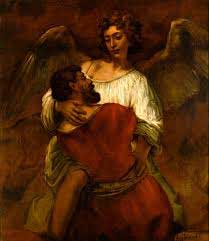 gesture, giving his blessing. … This is not a blessing obtained through deceit but one given freely by God, which Jacob can now receive because, without cunning or deception, he gives himself over unarmed, accepts surrender and admits the truth about himself”.
gesture, giving his blessing. … This is not a blessing obtained through deceit but one given freely by God, which Jacob can now receive because, without cunning or deception, he gives himself over unarmed, accepts surrender and admits the truth about himself”.
In the episode of the fight at the ford of Jabbok, the Pope observed, “the people of Israel speak of their origin and outline the features of a unique relationship between God and humanity. This is why, as also affirmed in the Catechism of the Catholic Church, ‘from this account, the spiritual tradition of the Church has retained the symbol of prayer as a battle of faith and as the triumph of perseverance'”.
“Our entire lives”, concluded the Holy Father, “are like this long night of struggle and prayer, passed in the desire of and request for God’s blessing, which cannot be ripped away or won over through our strength, but must be received with humility from Him as a gratuitous gift that allows us, finally, to recognize the face of the Lord. And when this happens, our entire reality changes: we receive a new name and God’s blessing”.
AG/ VIS 20110525 (620)
updated…the complete text in English from Vatican.va:
top
BENEDICT XVI
GENERAL AUDIENCE
St. Peter’s Square
Wednesday, 25 May 2011
[Video]
Dear Brothers and Sisters,
Today I would like to reflect with you on a text from the Book of Genesis which recounts a rather curious incident in the narrative of the Patriarch Jacob. It is a passage that is not easy to interpret, but it is important for our life of faith and prayer; we are talking about the story of his struggle with God at the ford of the Jabbok, a portion of which we just heard.
As you will recall, Jacob had deprived his twin brother Esau of his birthright in exchange for a dish of lentils and then, by trickery, managed to receive the blessing from his father Isaac, now very elderly, taking advantage of the latter’s blindness. Having fled from Esau’s wrath, he took refuge with one of his relatives, Laban; he married, acquired some wealth, and was returning to his homeland, ready to face his brother having first put into place some prudent provisions. However, when everything was ready for this meeting, after having had those who were with him cross the ford of the stream that marked the boundary of Esau’s territory, Jacob, who had remained behind alone, was suddenly set upon by an unknown man with whom he wrestled the whole night. This hand-to-hand combat, which we find described in chapter 32 of the Book of Genesis, became for him a singular experience of God.
Night is the favourable time for acting secretly, the best time, therefore, for Jacob to enter his brother’s territory unseen, perhaps thinking to take Esau by surprise. It is he, however, who is surprised by an unforeseen attack, one for which he was unprepared. Having used his cleverness to try to escape a dangerous situation, he thought he had managed to have everything under control; instead he now finds himself forced to enter a mysterious struggle that catches him alone and gives him no opportunity to organize a proper defence. Unarmed, in the night, the Patriarch Jacob wrestles with someone. The text does not specify the identity of the aggressor; it uses a Hebrew word that indicates “a man” in a generic sense, “one, someone”; it is, therefore, a vague, indeterminate definition that purposely keeps the assailant shrouded in mystery. It is dark, Jacob does not manage to see his opponent clearly, and even for the reader, for us, he remains anonymous; someone is opposing the Patriarch, and this is the only certain data supplied by the narrator. Only at the end, when the wrestling is over and that “someone” will have disappeared, only then will Jacob name him and be able to say that he had wrestled with God.
The episode, therefore, takes place in darkness and it is difficult to ascertain not only the identity of Jacob’s assailant, but also how the struggle is going. On reading the passage, it is rather difficult to determine which of the two contenders is gaining the upper hand; the verbs used often lack a specific subject, and the actions take place almost in a contradictory manner, so that when it looks as though one of the two is winning, the next action immediately denies that and shows the other to be the victor. At the beginning, in fact, Jacob seems to be the stronger and of his opponent, the text says, “he did not prevail over him” (v. 25); yet he strikes Jacob’s hip at its socket, dislocating it. Thus one thinks that Jacob would have to give in, but instead it is his opponent who asks him to release him; and the Patriarch refuses, setting one condition: “I will not let you go, unless you bless me” (v. 27). The one who tricked his brother and robbed him of the blessing of the firstborn now claims it from the stranger, thus perhaps beginning to perceive some kind of divine meaning, but without yet being able to recognize it for certain.
His rival, who seems to be held back and therefore defeated by Jacob, rather than giving in to the Patriarch’s request, asks him his name: “What is your name?”. And the Patriarch replies: “Jacob” (v. 28). Here the struggle takes an important turn. In fact, knowing someone’s name implies a kind of power over that person because in the biblical mentality the name contains the most profound reality of the individual, it reveals the person’s secret and destiny. Knowing one’s name therefore means knowing the truth about the other person and this allows one to dominate him. When, therefore, in answer to the unknown person’s request Jacob discloses his own name, he is placing himself in the hands of his opponent; it is a form of surrender, a total handing over of self to the other.
However, in this act of surrender paradoxically Jacob too emerges victorious because he receives a new name with the recognition of his victory by his adversary, who says to him: “You shall no longer be spoken of as Jacob, but as Israel, because you have contended with divine and human beings and have prevailed” (v. 29). “Jacob” was a name that recalled the Patriarch’s problematic beginnings; in Hebrew, in fact, it recalls the term “heel” and takes the reader back to the time of Jacob’s birth when, as he left his mother’s womb, he held onto the heel of his twin brother (cf. Gen 25:26), almost prefiguring the unfair advantage he would take over his brother in adulthood; however the name Jacob also recalls the verb “to deceive, to supplant”. Well, now, in the struggle in this act of surrender and submission, the Patriarch reveals his true identity as a deceiver, the one who supplants; however the other, who is God, transforms this negative reality into something positive: Jacob the deceiver becomes Israel, he is given a new name as a sign of a new identity. Here, too, the account maintains its deliberate duplicity because the more probable meaning of the name Israel is “God is strong, God is victorious”.
Therefore Jacob has prevailed, he won — his adversary himself says so — but his new identity, which he has received from the adversary himself, affirms and bears witness to God’s victory. And when Jacob in turn asks his opponent his name, the latter refuses to say it, but reveals himself in an unequivocal gesture, giving him the blessing. The blessing that the Patriarch had requested at the beginning of the struggle is now granted him. However, it is not a blessing obtained through deceit, but one given freely by God, which Jacob can receive because he is now alone, without protection, without cunning or tricks; he gives himself over unarmed, agrees to surrender and confesses the truth about himself. Therefore, at the end of the struggle, having received the blessing, the Patriarch can finally recognize the other, the God of blessings: Truly, he says, “I have seen God face to face, and yet my life is preserved” (v. 30), and now he can cross the ford, the bearer of a new name but “conquered” by God and marked forever, limping because of the injury he received (v. 31).
Biblical exegetes give many interpretations to this passage; the scholars in particular recognize in it literary connotations and components of various genres, as well as references to some popular accounts. But when these elements are taken up by the authors of the Sacred texts and incorporated into the biblical narrative, they change their meaning and the text opens up to broader dimensions. For the believer the episode of the struggle at the Jabbok thus becomes a paradigm in which the people of Israel speak of their own origins and outline the features of a particular relationship between God and humanity. Therefore, as is also affirmed in the Catechism of the Catholic Church, “from this account, the spiritual tradition of the Church has retained the symbol of prayer as a battle of faith and as the triumph of perseverance” (n. 2573). The Bible text speaks to us about a long night of seeking God, of the struggle to learn his name and see his face; it is the night of prayer that, with tenacity and perseverance, asks God for a blessing and a new name, a new reality that is the fruit of conversion and forgiveness.
For the believer Jacob’s night at the ford of the Jabbok thus becomes a reference point for understanding the relationship with God that finds in prayer its greatest expression. Prayer requires trust, nearness, almost a hand-to-hand contact that is symbolic not of a God who is an enemy, an adversary, but a Lord of blessing who always remains mysterious, who seems beyond reach. Therefore the author of the Sacred text uses the symbol of the struggle, which implies a strength of spirit, perseverance, tenacity in obtaining what is desired. And if the object of one’s desire is a relationship with God, his blessing and love, then the struggle cannot fail but ends in that self-giving to God, in recognition of one’s own weakness, which is overcome only by giving oneself over into God’s merciful hands.
Dear brothers and sisters, our entire lives are like this long night of struggle and prayer, spent in desiring and asking for God’s blessing, which cannot be grabbed or won through our own strength but must be received with humility from him as a gratuitous gift that ultimately allows us to recognize the Lord’s face. And when this happens, our entire reality changes; we receive a new name and God’s blessing. And, what is more: Jacob, who receives a new name, and becomes Israel, also gives a new name to the place where he wrestled with God, where he prayed; he renames it Penuel, which means: “The Face of God”. With this name he recognizes that this place is filled with the Lord’s presence, making that land sacred and thus leaving a memorial of that mysterious encounter with God. Whoever allows himself to be blessed by God, who abandons himself to God, who permits himself to be transformed by God, renders a blessing to the world. May the Lord help us to fight the good fight of the faith (cf. 1 Tim 6:12; 2 Tim 4:7) and to ask, in prayer, for his blessing, that he may renew us in the expectation of beholding his Face. Thank you.
top

